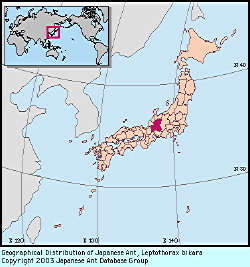
|
species
|
Leptothorax bikara
|
 |
Japanese Name
|
Yadori-muneboso-ari
|
Original Reference
|
|
Terayama, M. & K. Onoyama (1999) The ant genus Leptothorax Mayr (Hymenoptera; Formicidae) in Japan. Memoirs of the Myrmecological Society of Japan 1: 71-97.
|
Description
|
|
Total length of workers around 2 mm. Body color black to blackish brown. Antennal scapes not reaching posterior margin of head in frontal view. Dorsal outline of mesosoma straight in profile. Dorsal disc of propodeum flat. Metanotal groove weakly incised dorsally. Propodeal spines long, acute and narrow; each distinctly longer than its basal width. Petiolar peduncle short, with parallel dorsal and ventral margins in lateral view; node in profile a relatively narrow inverted U-shape; viewed anteriorly it has a straight dorsal margin, parallel sides and angulate dorsolateral corners. Postpetiole trapezoidal in dorsal view, broadest posteriorly.
|
Remarks
|
|
Leptothorax bikara might be a social parasite of other Leptothorax species. Twenty-six workers have been collected from a nest of Leptothorax spinosior, and a putative alate female has been taken in a nest of Leptothorax makora (Kinomura, pers. comm.). This species is distinguished from L. spinosior and L. makora by the straight dorsal outline of its mesosoma, the parallel dorsal and ventral margins and parallel sides of its petiolar peduncle, and the transverse, trapezoidal postpetiolar dorsum.
This species corresponds to Leptothorax sp. 13 in Myrmecological Society of Japan Editorial Committee (1992).
|
|

Distribution
|
|
Honshu (Gifu Pref. [Kyouichi Kinomura leg.]).
|
|
References
|
|
- Terayama, M. & K. Onoyama (1999). The ant genus Leptothorax Mayr (Hymenoptera; Formicidae). Memoris of the Myrmecological Society of Japan 1: 71-97.
- Myrmecological Society of Japan, Editorial Committee (ed.) (1992). A guide for the identification of Japanese ants (III). Myrmicinae and suppliment to Leptanillinae (Hymenoptera: Formicidae). 94pp. The Myrmecological Society of Japan, Tokyo.
|
Editor
|
|
Original text by Mamoru Terayama, Keiichi Onoyama, and Masaaki Morisita. English translation by Mamoru Terayama, edited by Robert W. Taylor.
|
|